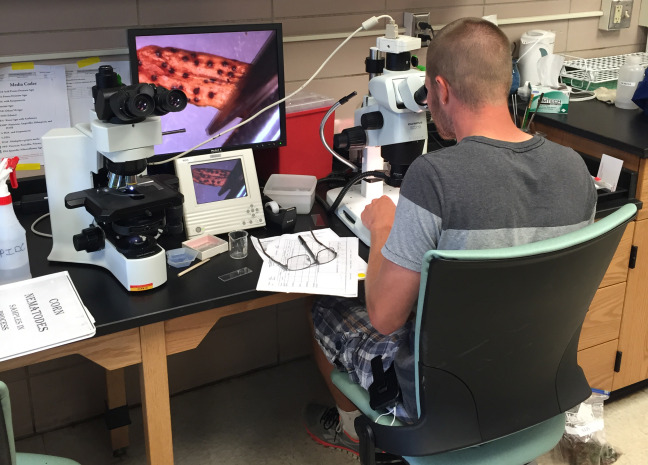
Ed Zaworski, a program specialist at the ISU Plant and Insect Diagnostic Clinic, examines fungal fruiting bodies from a yew. The clinic can help identify insects, plants and mushrooms and troubleshoot problems for growers. Photo courtesy of Laura Jesse. Larger image.
AMES, Iowa – Got a sick plant that you’re not sure how to help? Or maybe you’ve discovered a certain bug or mushroom on your property but you’re not sure what it is. Or maybe you just applied too much herbicide on your lawn and you’re worried what might happen.
These are the people to call.
The ISU Plant and Insect Diagnostic Clinic helps to identify and treat a range of plant and insect problems. Whether you’re a professional fruit or vegetable grower, a turf manager on a golf course or a private homeowner with a sick oak tree, the team of diagnosticians will try to get to the bottom of what’s going on.
Laura Jesse, the clinic’s director and a diagnostician who specializes in entomology, said the clinic strives to help clients respond to pests and plant diseases efficiently and effectively. For instance, with bed bugs making headlines, clients may wake up with itchy skin and fear the worst, Jesse said. But the clinic can sometimes allay those fears just by looking at a photo or examining a sample.
“Very often, people start using insecticides and start spraying themselves with repellent or applying it to their clothes or bedding,” she said. “It’s rewarding when I can give them information about what the insect is and how to manage it in a way that reduces or eliminates their exposure to insecticides. Sometimes, it may just be a skin allergy or a species of insect that’s more common, and there’s no reason to worry.”
Daren Mueller, an assistant professor of plant pathology and microbiology who works closely with the clinic as the coordinator of the ISU Integrated Pest Management program, said the clinic acts as a resource to help growers troubleshoot problems.
“We want people to be more successful at growing whatever they’re growing,” Mueller said. “It’s a lot like an emergency room. People come to us when there’s something wrong, and we try to do our best to figure out what’s causing the problem.”
The clinic receives thousands of samples every year for identification and diagnosis. Most samples come from Iowa, but the clinic gets samples from across the country as well.
The clinic has a trio of diagnosticians on staff with expertise on diseases and insect pests that affect field crops, fruits, vegetables, trees and ornamental plants. They can cover a lot of ground on their own, but, when necessary, they can also bring in other Iowa State University experts.
“The clinic can act as a liaison between clients and other faculty at Iowa State, whether they’re part of the College of Agriculture and Life Sciences, or from a different department,” Mueller said. “That way, we can bring a huge range of knowledge and expertise to bear on any particular problem.”
Anyone who wishes to submit a sample for diagnosis by the clinic should start on the clinic’s website, clinic.ipm.iastate.edu. Clients fill out a form that helps the diagnosticians understand the symptoms a plant is experiencing, the environmental conditions the plant has experienced and any management techniques growers have used.
Plant problem diagnoses cost $20, unless a job requires special lab work. The clinic charges $10 per sample for household pests and plant or mushroom identification.
Lina Rodriguez, one of the clinic’s diagnosticians, said the majority of samples submitted to the clinic result in open-and-shut cases. For instance, Rodriguez said the clinic recently identified a case of Goss’s wilt in a corn sample. And, as the clinic’s arbor specialist, she sees many cases of oak wilt, a fungal disease that can be transmitted among oak trees when the roots of different trees touch and fuse together.
But every once in a while, a case comes along that presents the team with a mystery. Those cases can lead to some in-depth lab work to solve, Rodriguez said.
“The majority of the time, we can figure out what’s happening pretty quickly,” she said. “But sometimes there’s some ambiguity. Some cases require a little detective work.”